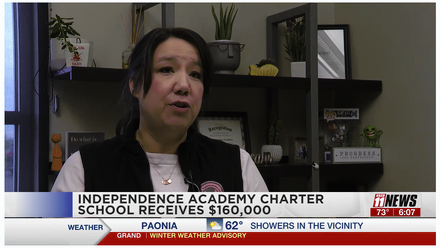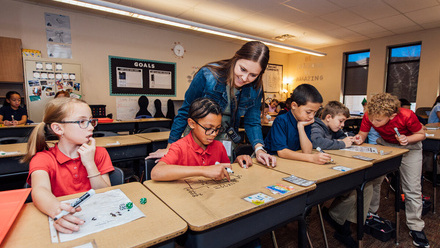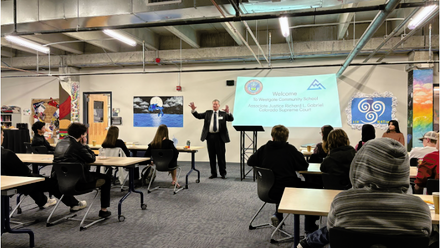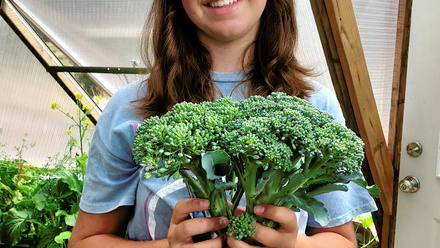Empowering Education with Agriculture and Environmental Stewardship
By Kim Daly, Contributing Writer
Few students can say that they’ve interacted with animals beyond cats and dogs, but those at The STEAD School and Westgate Community School are among those who can. By integrating agricultural and environmental education into their curricula, these public charter schools offer students unparalleled opportunities to connect with the natural world and pursue impactful STEM-based careers.
Growing Agricultural Talent
At The STEAD School, ninth through twelfth grade students embark on a journey where agriculture meets innovation and inclusivity. Rachel Balkcom, Director of Partnerships and Work-Based Learning, describes the school as a critical response to the needs of Colorado’s agricultural industry, which spans nearly 32 million acres and generates $47 billion annually.
"The average person in agriculture is aging, and the field lacks diversity and educational partnerships," Balkcom notes. STEAD addresses these challenges with an inclusive environment where students explore diverse pathways in agricultural sciences, filling a vital talent pipeline.
A Cognia STEM certified school, they are also one of the few in the state offering the AP Capstone Program, both as an alternative to agriculture pathways or as a concurrent option. STEAD’s mission centers on "learning by doing." “Head, hearts, and hands,” she says, “are engaged in active project-based learning as students develop their unique passions.”
Maintaining state-of-the-art facilities, such as greenhouses and animal science buildings, requires additional funding. Yet these challenges also foster leadership opportunities for students, who play an active role in designing and maintaining these spaces.
"At STEAD, students who thrive are those who seek immediate relevance in their education," Balkcom emphasizes.
Cultivating Environmental Stewardship
Agricultural education and environmental stewardship start early at Westgate Community School and evolve as students progress through grades K-12. Charlie Kahn, Environmental Education Coordinator, shares that, "Environmental learning is often relegated to summer camps or field trips." Westgate changes that by integrating these lessons into its regular curriculum, creating unique educational experiences.
The school’s on-campus farm features 17 chickens, four goats, three bee hives, extensive garden spaces and multiple outdoor classroom spaces. Kahn says students across grade levels explore everything from animal husbandry and genetics to garden design and agribusiness. Younger students learn empathy and animal care, while older students tackle complex projects like designing coops and managing gardens.
Partnering for the Future
One of STEAD’s standout features is its deliberate integration of career exploration and community partnerships. With over 100 partners — including organizations like the USDA Agricultural Research Service and CU Boulder — STEAD provides students with opportunities to address climate change, food justice, and ecological sustainability.
Balkcom explains that graduates will enter an agricultural field that has the potential to transform history.
“Food is ground zero for climate smart production. The network of marginalized agriculture industry professionals into which our students will step is focused on regenerative processes, cultural food ways, and de-commodification of food.”
Through mandatory internships and accelerator weeks, students engage in positions, including working in hydroponics greenhouses, designing animal science facilities, and joining service-oriented accelerators. Students may also work in equine therapy centers, local elementary schools, or animal shelters.
These opportunities not only enhance their resumes but also instill a sense of civic responsibility. All STEAD students graduate with a robust set of work and community service experiences compiled in a professional portfolio.
Creating Community Connections
At Westgate, the school partners with Adams 12 Future Forward School’s vet assistant program, providing their students with invaluable hands-on veterinary experiences. "Since the vet program doesn’t have animals on-site, our partnership is a natural fit," Kahn explains. Vet students visit their farm to practice essential skills like hoof trimming, chicken check-ups, and administering vaccines. Starting in January, the school will host interns from the program who will support farm operations and learn the tricks of the trade.
It’s a need that will likely grow after the recent passage of Colorado Proposition 129 which created a new veterinary career path: a mid-level practitioner position known as a veterinary professional associate (VPA).
“It’s a win-win for everyone," says Kahn, who also hosts field trips for other public schools within the Adams 12 school district.
But that’s not all. Outside the classroom, Westgate’s "Chicken Tenders" volunteer initiative trains families to care for the school’s animals, fostering community engagement. Families get valuable time together, a free outdoor experience — and free eggs! An upcoming Community Garden Club will offer families the chance to cultivate garden plots while learning sustainable farming techniques.
"Established families understand that being a Westgate student means getting dirty sometimes," Kahn remarks, highlighting the school’s unique approach to experiential learning. And yes, that includes chicken poop on shoes.
Lasting Impact
Agricultural, experiential, and environmental programs such as these exemplify the innovation possible in public charter schools. They serve as an example for empowering students to become leaders in STEM, sustainability, innovation, and social justice. Their success lies in combining rigorous academics with hands-on learning and local partnerships, fostering a generation that is deeply connected to their communities and the world around them.
Seeking more than a traditional education? These schools offer compelling opportunities to engage with agriculture and environmental science in transformative ways. As Kahn reflects, "Few students can say they’ve walked goats or tended bees at school. These experiences leave lasting impressions and open doors to futures students may never have imagined."






